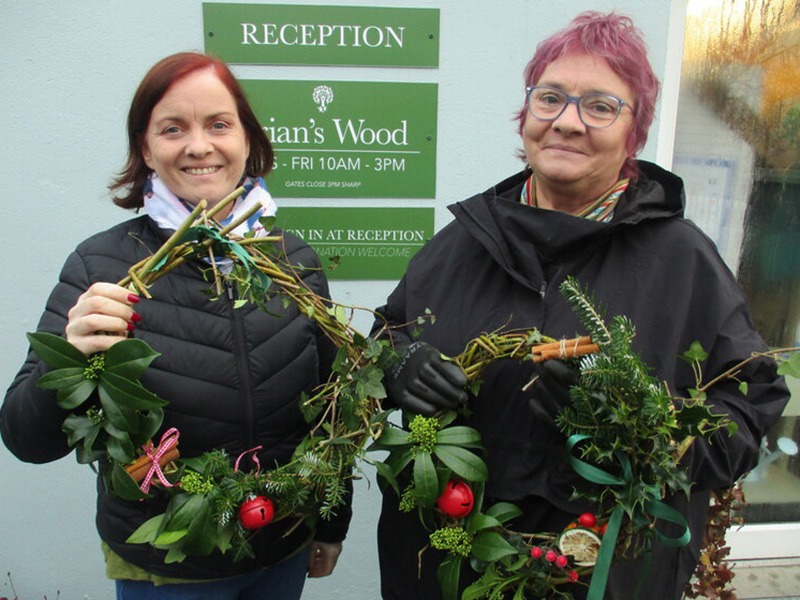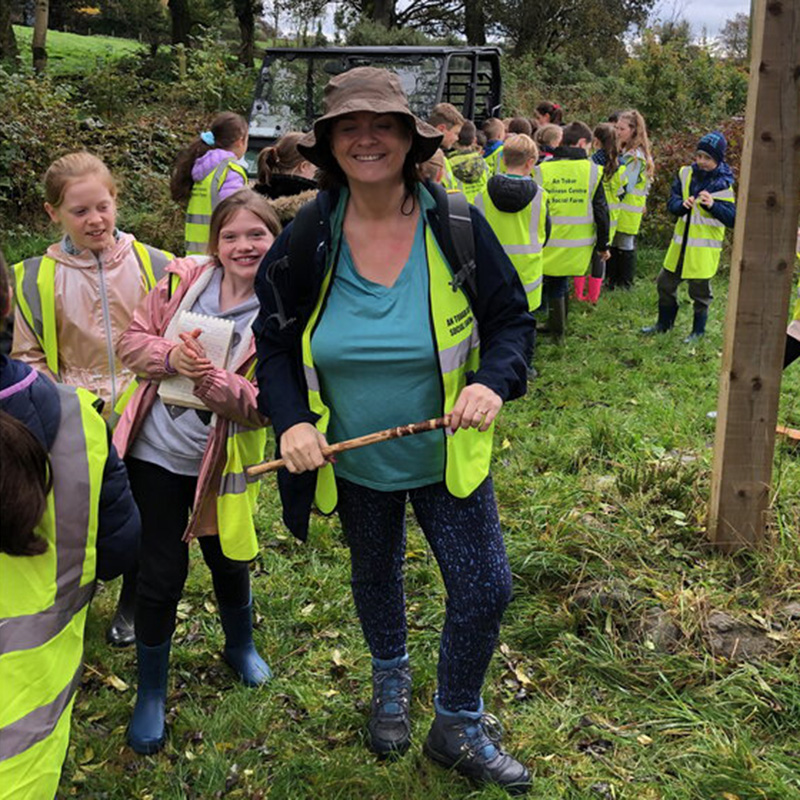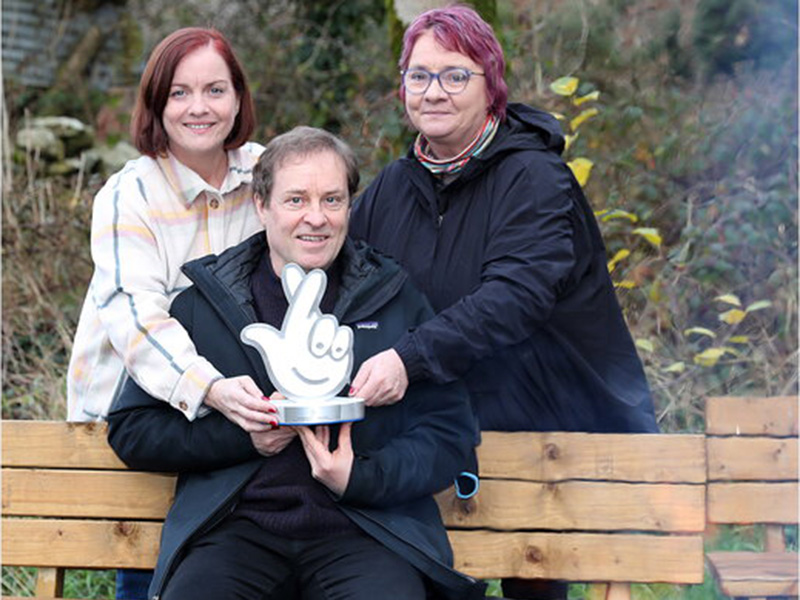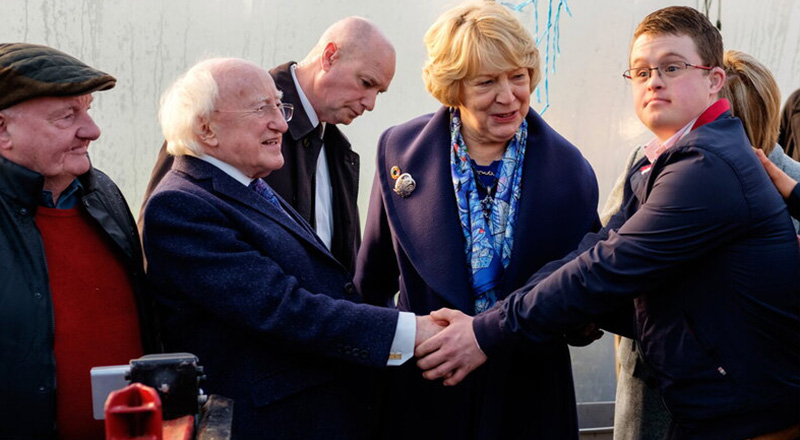Not only do farmers keep everyone fed and watered, but they also play a vital role in the health and wellbeing of rural communities, as a farm in South Armagh, Northern Ireland, has proved.
By Jenny Lee
Helping create “a 21st-century healing place” by using the power of nature, local sisters Margaret and Kathleen Finnegan founded the An Tobar Community Wellness Centre and Social Farm in Silverbridge in October 2018.

“ ‘An Tobar’ means ‘The Well’ or ‘Well-spring’, and takes its name from a well on our farm that our grandfather and our ancestors used for ‘healing’ or cures,” says Kathleen, who previously ran a horticulture and garden centre on the farm.
Becoming a social enterprise in order to “give back to the community”, their aim was to provide social farming opportunities, improve the health and wellbeing of their community, and combat social isolation.
For the past five years, they have reached out to those with dementia, school children, people with mental health issues, minority groups and carers, and have an on-going contract with the Southern Health & Social Care Trust to provide social farming to a group of adults with learning disabilities.
“We always knew that working outdoors with nature had a great therapeutic potential, but we have been genuinely amazed at how it has helped people reintegrate with the community and regain their confidence”, says Kathleen.
Social farming, which uses agriculture to promote therapy, rehabilitation, social inclusion, education and social services, is a relatively new concept in Northern Ireland.

“The wonderful thing about social care farming is it’s meaningful work for people, and it’s also useful for us as farmers. It’s a win-win situation.
“These guys would have been bused into daycare facilities in Newry [the nearest city, around 12 miles from the farm in Silverbridge], or further afield. Now they are in a community-based service which gives them a purpose and self-worth.”
Participants, aged from 20 to 70, are involved in feeding cattle and pigs, collecting eggs, growing vegetables and flowers, planting trees, helping make forest trails, and many other day-to-day farming tasks.
Some of this work can be seen in the UTV Rare Breed – A Farming Year programme, which reflects the diversity and innovation in Northern Ireland’s agri-sector, by following 12 farming families throughout a year.
Next in the documentary series, viewers will see the farm prepare its 30 varieties of fruit and vegetables for harvest and provide goods for the farm’s tea room.
In future episodes, audiences can see them experiment with biofuel, make Christmas wreaths, and witness how they turned their woodland into a classroom by running their first forest school programme.
During forest school classes, An Tobar uses their outdoor classroom to help children and young people learn about nature through mindfulness, bushcraft, cooking over a fire, making crafts with wood, and building dens”.

Kathleen stresses that forest schools are accessible to people of all abilities and are beneficial for mental well-being.
“The idea of connecting with nature is in our DNA as a human species. An academic setting is not a level playing field, and a lot of children are excluded. Forest schools are about allowing children to learn how to have free play and to develop skills, confidence, self-esteem and team building naturally through play outside”.
The biophilia hypothesis, developed by Harvard Professor Edward O Wilson, suggests that humans possess an innate tendency to seek connections with nature and other forms of life.This philosophy that people feel better just from being outside and in touch with nature is something An Tobar is built upon and which Kathleen hopes future generations cling to.
“This was something that was inherently known by our ancestors, something which we as a modern society have perhaps lost. This disconnection with nature is detrimental to our physical and mental health and also places our global environment in jeopardy.”
Placed in the beautiful setting of South Armagh’s Ring of Gullion area, the 40 acre [16 hectares] farm is home to Brian’s Wood, a woodland in which they have planted 16,000 native trees – the first of which was planted by President Michael D. Higgins.

Named after two of their late uncles, the woodland is open to the public for walks. Last year, it was further enhanced with new nature, poetry and fairy trails and interactive signage, with Brian’s Wood Heritage Project being named the 2022 National Lottery Northern Ireland Project of the Year.
As Ireland is one of the most deforested parts of Europe, the Finnegan family are proud of their contribution to sustainability and biodiversity in the area and through their website memorytreesireland.com they offer people the opportunity to dedicate a tree in their new native woodland to a loved one.
Trees could be branded as superpowers, for their ability to absorb carbon dioxide from the air and thus help people breathe more easily and boost their immune systems.
Kathleen points out that a simple walk in a woodland can also benefit your mental health.
“There’s been a lot of research done that measured people’s cortisol levels and blood pressure on the way into the forest at the start of a walk and again on the way out and proved it lowers their stress levels. A walk on a concrete path in a town will not produce the same results”.
Margaret, who also works with carer groups at the farm, is trained in social therapeutic horticulture, eco-therapy and nature immersion, which is inspired by forest bathing which originated in Japan in the 1980s to counteract high levels of depression and suicide, and combines deep breathing with the peace and quiet of being amongst trees to boost wellbeing in a natural way.
Also making a positive contribution to the family farm is Kathleen’s daughter Hannah, who has created Cafe Amach (Cafe Out), also located in County Armagh, which provides a safe space for young LGBTQ+ people to socialise.
“The whole idea of An Tobar is that it’s an inclusive space for everybody, regardless of age, ability, gender or religion. A lot of people say it’s like a home away from home for them, especially people that maybe feel excluded in other mainstream places,” adds Kathleen.
Looking forward at An Tobar, there are plans to plant an orchard this year, produce their own juice, and to further experiment with biofuel.
This story was originally published on The Irish News and is republished within the Human Journalism Network program, supported by the ICFJ, International Center for Journalists.
